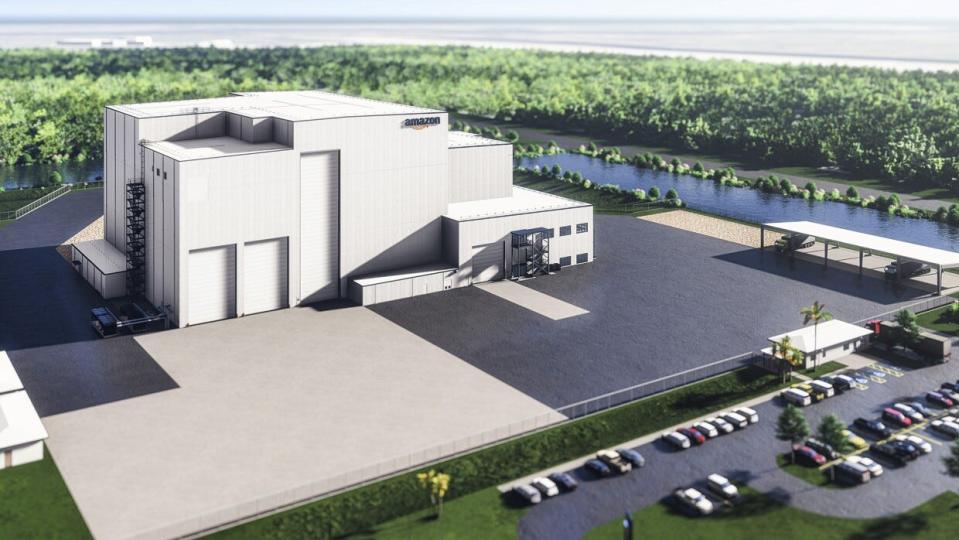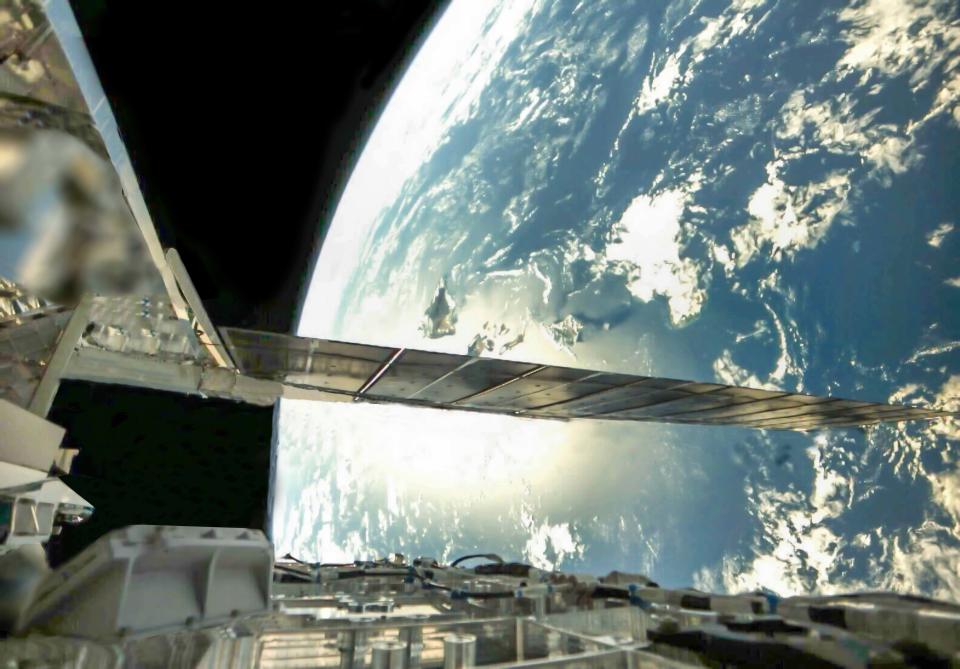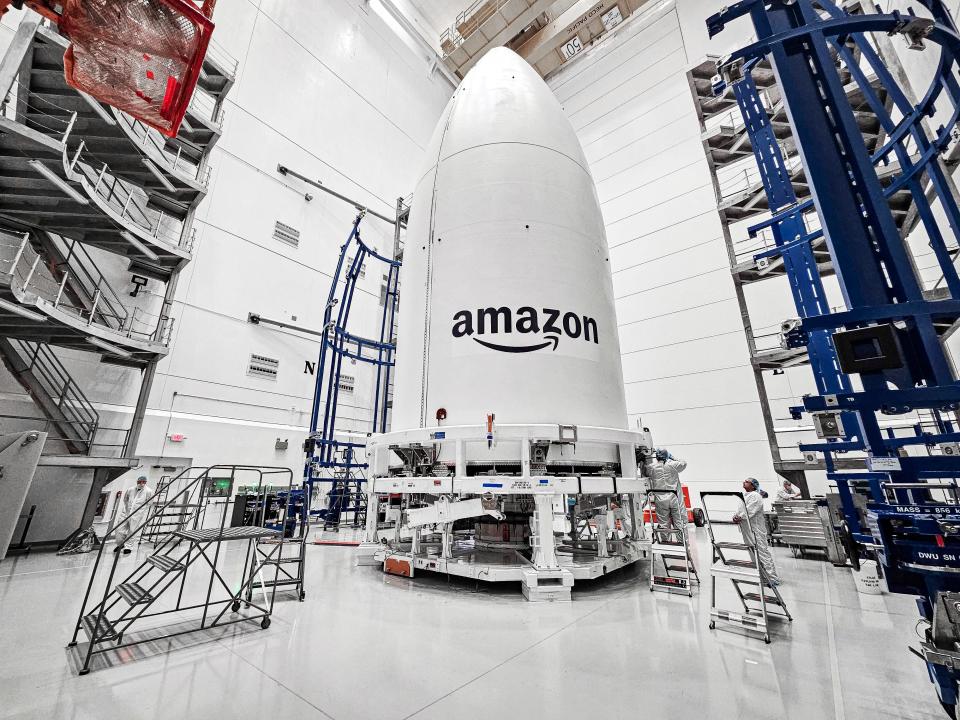Amazon's Project Kuiper satellite internet to generate dozens of launches from Space Coast
Expect ecommerce giant Amazon to quickly become a major player in the Space Coast's commercial space industry when it begins building its Project Kuiper broadband satellite constellation.
"Our satellites, we're making all those in-house in Kirkland, Washington. We're going to have the capability, when that's up and running at full capacity, to make up to five satellites a day. And then they'll be shipped here," Brian Huseman, vice president of public policy and community engagement, told the National Space Club Florida Committee.
"I don't have an exact time frame for the next few launches, but it will in the coming months ... Our FCC license states that half of our 3,236 satellites should be in air by July of 2026. So that timeframe is what we're working backwards from," he said.

Satellites: Race for bandwidth: Internet satellites fuel record-breaking launch year on Space Coast
Huseman delivered updates on Amazon's $10 billion Project Kuiper satellite initiative Tuesday during a fireside chat-style discussion at the committee's monthly luncheon at Radisson Resort at the Port in Cape Canaveral.
Satellite manufacturing is underway at Project Kuiper’s 172,000-square-foot Kirkland factory, Amazon announced Monday. At NASA's Kennedy Space Center, construction continues on Amazon's $120 million satellite processing facility to prep those satellites for launch into low-Earth orbit.
Huseman said Amazon is advertising to hire 50 full-time employees at KSC with average salaries of at least $80,000, including skilled workers, logistics personnel, mission managers and engineers.

The company has announced agreements to send up satellites on up to 83 launches. United Launch Alliance’s Vulcan and Atlas V rockets and Blue Origin’s future New Glenn rocket will handle the lion's share of those missions, lifting off from Cape Canaveral Space Force Station.
Amazon will designate 18 of those launches for Arianespace’s Ariane 6 rocket, which will fly from the Guiana Space Center in French Guiana.
Project Kuiper is Amazon's plan to deploy a constellation of 3,236 satellites in low-Earth orbit "to bring fast, affordable broadband to unserved and underserved communities around the world."
"Hundreds of millions of people on Earth lack reliable internet access. Project Kuiper will help close the digital divide by delivering fast, affordable broadband to a wide range of customers, including consumers, businesses, government agencies, and other organizations operating in places without reliable connectivity," the Amazon website says.
We had an incredibly insightful conversation with Brian Huseman, Vice President of Public Policy and Community Engagement at @Amazon, and members of the Space Club today. We delved into Amazon's choice of Florida for expanding @ProjectKuiper and the significant impact it has on… pic.twitter.com/3QJtz2kVbN
— Space Florida (@SpaceFlorida) May 14, 2024
Competitor SpaceX continues expanding Starlink constellation
Meanwhile, SpaceX continues expanding its sprawling Starlink internet satellite constellation with its routine schedule of Falcon 9 rocket launches from the Space Coast and California. Florida's most recent Starlink mission lifted off Sunday night.
SpaceX now has 5,941 functioning Starlink satellites in orbit, according to Jonathan McDowell, an astrophysicist at the Harvard–Smithsonian Center for Astrophysics.
"There are billions of customers that are unserved and underserved around the world. We think in this space, there is room for multiple winners here, multiple offerings," Huseman told FLORIDA TODAY after his luncheon speech.
"At Amazon, we pride ourselves on having high-quality, affordable services and new devices. So that's what we're really going to be optimizing on our Project Kuiper," he said.
Huseman said Amazon plans to start offering beta internet service for its earliest enterprise customers by year's end. Pricing packages have yet to be announced, he said.

Project Kuiper prototype launch a success
Last October, a ULA Atlas V roared away from Cape Canaveral Space Force Station carrying Amazon's prototype KuiperSat-1 and KuiperSat-2 satellites into low-Earth orbit.
The following month, Amazon reported the test mission had achieved a 100% success rate: "Every major system and subsystem on board our two prototypes demonstrated nominal or better performance following launch," a blog post said.
Huseman said the Project Kuiper constellation will serve the Earth's surface between 56 degrees north latitude and 56 degrees south latitude, where about 95% of the world's population lives.
He said Amazon will offer business customer terminals that deliver up to 1 gigabit of data per second, standard customer terminals that deliver 400 megabits per second, and Kindle-sized terminals that deliver 100 megabits per second.
For the latest news from Cape Canaveral Space Force Station and NASA's Kennedy Space Center, visit floridatoday.com/space.
Rick Neale is a Space Reporter at FLORIDA TODAY. Contact Neale at Rneale@floridatoday.com. Twitter/X: @RickNeale1
This article originally appeared on Florida Today: Amazon ramps up for Project Kuiper satellite launches from Space Coast

